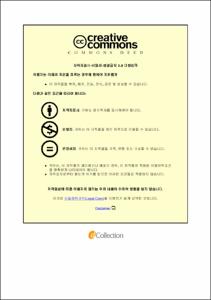간호대학생의 의사소통능력과 문제해결능력이 대학생활적응에 미치는 영향
- Issued Date
- 2019-08
- Abstract
- The purpose of this study was to examine the relationships among communication competence, problem solving skills, and adaptation to college life for nursing students, and was to investigate the influencing factors of nursing students’ adaptation to college life in order to provide basic data to improve the nursing students’ adaptation to college life. This study is based on a survey conducted from March 11, 2019 to March 26, 2019 and 209 nursing students from two universities located in D metropolitan city participated in the study. The instruments were used for the study were Communication Competence, Problem Solving Skills, Student Adaptation to College Questionnaire. For data analysis, descriptive statistics, t-test and ANOVA, Pearson’s correlation coefficient and Hierarchial Multiple Regression analysis were performed using the SPSS 25.0 program. The mean value of communication competence was 58.65±6.73 out of 75, problem solving skills was 163.32±17.63 out of 225, and adaptation to college life of nursing students was 231.83±29.19 out of 335. There were statistically significant differences in nursing students’ adaptation to college life in terms of health condition(F=20.16, p<.001) and satisfaction about the major (F=13.28, p<.001). There was significant positive correlation between nursing students' adaptation to college life and communication competence(r=.60, p<.001); between nursing students' adaptation to college life and problem solving skills(r=.34, p<.001); between nursing students' adaptation to college life and problem recognition(r=.25, p<.001); between nursing students' adaptation to college life and analytic ability(r=.24, p<.001); between nursing students' adaptation to college life and widespread thinking(r=.21, p=.003); between nursing students' adaptation to college life and decision making(r=.26, p<.001); between nursing students' adaptation to college life and planning ability(r=.21, p=.003); between nursing students' adaptation to college life and acting and taking risks skills(r=.36, p<.001); between nursing students' adaptation to college life and evaluation skills(r=.17, p=.016); between nursing students' adaptation to college life and feedback skills(r=.36, p<.001). The significant influencing factors on the effects of nursing students’ adaptation to college life were communication competence(β=.41, p<.001), satisfaction about the major(β=.31, p<.001), health condition(β=.24, p<.001), feedback skills(β=.16, p=.019), acting and taking risks skills(β=.15, p=.038), and evaluation skills(β=-.14, p=.034), explaining 46.8% of the variance in the regression model. The higher the communication competence, satisfaction about the major, health condition, feedback skills, acting and taking risks skills of nursing students manifested the lower the evaluation skills of nursing students and the higher the adaptation to college life. In this regard, in order to enhance the college life adaptation of nursing students, it is required to provide education program for nursing students to strengthen their communication competence, satisfaction about the major, and their health status. In addition, it is needed to develop program in order to improve students’ feedback skills and acting and taking risk skills to enhance the problem-solving skills. Therefore, it is necessary to improve and develop the evaluation system and method for nursing students.
본 연구는 간호대학생의 의사소통능력, 문제해결능력, 대학생활적응의 관계를 알아보고, 의사소통능력과 문제해결능력이 대학생활적응에 미치는 영향을 확인하여 간호대학생의 대학생활적응을 향상시킬 수 있는 기초자료를 제공하기 위해 시도되었다. 본 연구는 2019년 3월 11일부터 2019년 3월 26일까지 D시에 위치한 2개 대학 1,2,3,4학년 간호대학생 209명을 대상으로 하였다. 연구도구는 의사소통능력, 문제해결능력, 대학생활적응을 측정하는 설문지를 제공하였고, 자료분석은 SPSS 25.0 프로그램을 이용하여 기술통계, t-test, ANOVA, Scheffe test, Pearson's correlation coefficient, Hierarchial Multiple Regression으로 분석하였다. 연구 결과 간호대학생의 의사소통능력은 총점 75점에 평균 58.65±6.73점, 문제해결능력은 총점 225점에 평균 163.32±17.63점, 대학생활적응은 총점 335점에 평균 231.83±29.19점으로 나타났다. 간호대학생의 대학생활적응은 건강상태(F=20.16, p<.001), 전공만족도(F=13.28, p<.001)에 따라 유의한 차이가 있었다. 간호대학생의 대학생활적응은 의사소통능력(r=.60, p<.001), 문제해결능력(r=.34, p<.001), 문제해결능력의 하위요인인 문제인식(r=.25, p<.001), 분석능력(r=.24, p<.001), 확산적사고(r=.21, p=.003), 의사결정(r=.26, p<.001), 기획력(r=.21, p=.003), 실행과 모험 감수(r=.36, p<.001), 평가(r=.17, p=.016), 피드백(r=.36, p<.001)과 양의 상관관계가 있었다. 간호대학생의 대학생활적응에 영향을 미치는 요인을 분석한 결과 의사소통능력(β=.41, p<.001), 전공만족도(β=.31, p<.001), 건강상태(β=.24, p<.001), 피드백(β=.16, p=.019), 실행과 모험 감수(β=.15, p=.038), 평가(β=-.14, p=.034)가 대학생활적응에 유의미한 영향을 미치는 요인으로 나타났고 전체 설명력은 46.8%이었다. 간호대학생의 의사소통능력과 전공만족도, 건강상태, 문제해결능력의 하위요인 중 피드백, 실행과 모험 감수 능력이 높을수록, 평가 능력이 낮을수록 대학생활적응은 높게 나타났다. 따라서 간호대학생의 대학생활적응을 향상시키기 위해서는 의사소통능력, 전공만족도, 건강상태를 높이기 위한 지속적인 교육과 훈련이 필요할 것으로 생각된다. 또한 문제해결능력의 하위요인 중 중 피드백, 실행과 모험 감수 능력을 향상시키기 위한 프로그램의 개발 및 적용이 필요할 것이며 학생 평가 방식의 개선과 다양화가 필요하다.
- Alternative Title
- The Effect of Communication Competence and Problem-solving Skills of Nursing Students
- Awarded Date
- 2019-08
- Degree
- 석사
- Citation
- 최진주. (201908). 간호대학생의 의사소통능력과 문제해결능력이 대학생활적응에 미치는 영향.
- Type
- Thesis
- Source
- http://dcollection.kmu.ac.kr/common/orgView/000000118115
- Appears in Collections:
- 2. College of Nursing (간호대학) > 석사
- 파일 목록
-
-
Download
 THESIS-Nursing-2019-034.pdf
기타 데이터 / 551.7 kB / Adobe PDF
THESIS-Nursing-2019-034.pdf
기타 데이터 / 551.7 kB / Adobe PDF
-
Items in Repository are protected by copyright, with all rights reserved, unless otherwise indicated.